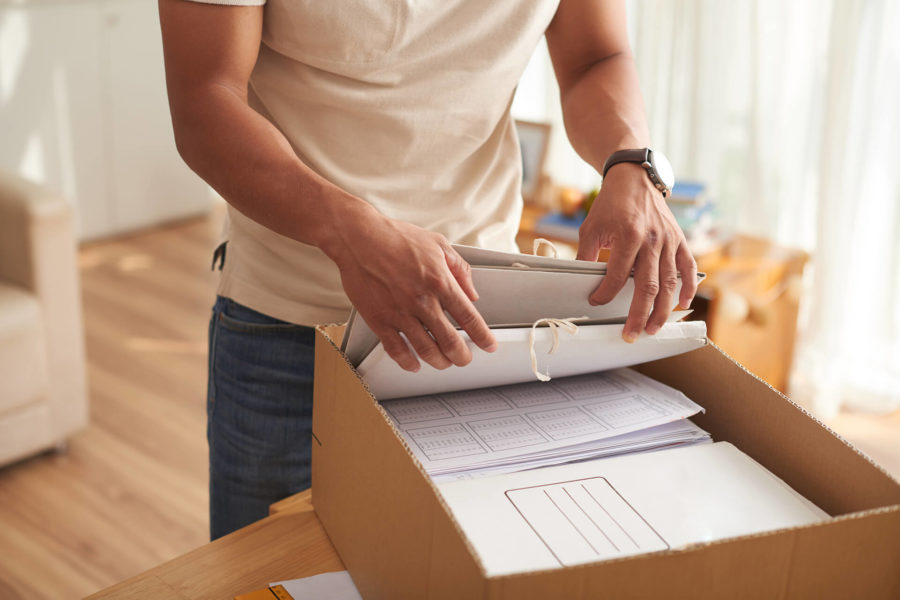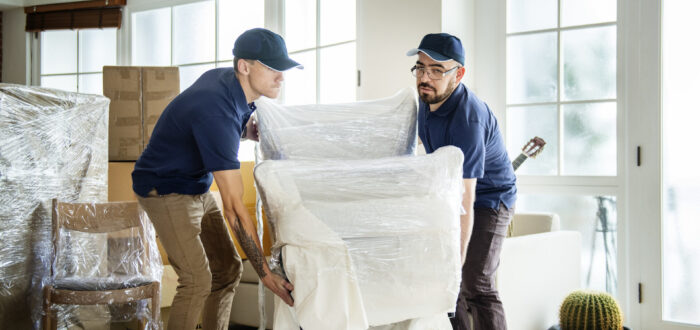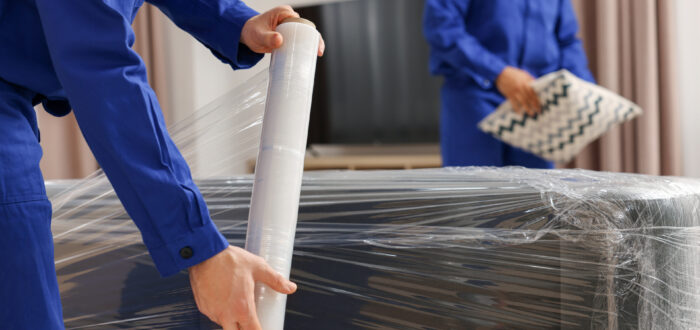

Create Your Own Perfect Moving into a New House Checklist
Posted in Moving Essentials,Moving Tips & Tricks on March 13, 2023
Creating a moving into a new house checklist is surely the best thing you can do for yourself when preparing for relocating, one of the biggest events in your life. There are many things you need to consider before you can settle into your new home, and it can get messy if not organized in the best possible way. We’ll show you how to do it.
From packing and labeling to making sure you have the right utilities set up, there are many tasks that need to be completed to make your relocation a success. To help you stay on track, we have the ultimate checklist for moving into a house to follow and have an effortless relocation. So grab a cup of coffee, sit back, and let’s dive into the tasks you should do.
Before Making a List of Things to Do When Moving Into a New House, Create a Budget and Timeline for the Move
Before making a list of things to do when relocating to a new place, it’s important to create a budget and timeline for the relocation. This will help you stay organized, keep track of expenses, and ensure that you’re able to complete all necessary tasks on time.
Start by creating a budget that includes all of the costs associated with your relocation, such as hiring cross-country movers, purchasing packing supplies, and any other expenses you may incur. Then, create a timeline that outlines when each task needs to be completed, from packing new home essentials to setting up utilities in your new home. By taking the time to plan ahead, you’ll be better prepared for the process and can avoid any unexpected surprises.
Donate or Sell Items You Don’t Plan On Taking With You
When it comes to preparing for a relocation, it’s more than just good to declutter and get rid of any items you no longer need or want. This can not only help you save money on relocation expenses, but it can also make the entire process much easier and less stressful.
Consider donating or selling items that you don’t plan on taking with you, such as clothes that no longer fit, furniture that won’t fit in your new space, or kitchen appliances you no longer use.
You can donate these items to a local charity or thrift store or sell them online through websites like eBay or Facebook Marketplace.

A Moving Into a New House Checklist Should Include Researching the Area You’re Moving To
When relocating into a new house, it’s important to research the neighborhood, local amenities, and the overall vibe of the community. This will help you get the bigger picture of the place you’re relocating to, so ensure you do the following steps.
If You Have Kids, Researching Schools Should Be On Your Checklist
Finding the right school for your children is crucial to their academic and social success and can greatly impact your family’s overall happiness in your new home. Start by researching the school districts in your future area, and read reviews and rankings of local schools online.
Similarly, Researching Crime Rates Will Help You Choose a Neighborhood
No one wants to live in an unsafe neighborhood, and knowing the crime rates in an area can help you make an informed decision about where to live. You can research crime rates by checking with local police departments or using online tools like CrimeReports or NeighborhoodScout.
Look for Job Opportunities When Moving Across the Country
Looking for job opportunities in your new location can help you ensure a stable source of income and make the transition to your new home smoother. Start by researching companies in your industry in the area you’re relocating to, and check online job boards for open positions. It’s also a good idea to network with professionals in your field who live in the area and to reach out to local recruiters or staffing agencies for job leads.
Things to Do When Moving to a New Home – Start Packing Early and Label All Boxes
When it comes to organizing your relocation, starting to pack early and labeling all boxes is key. Packing can take much longer than you think, so it’s important to give yourself plenty of time to get everything organized and packed up. Start by making a list of all the rooms in your home and begin packing items you won’t need until after the move, such as out-of-season clothing, decor, and kitchen appliances you rarely use.
Be sure to label all boxes with the room they belong to and briefly describe what’s inside. This will make it much easier to unpack and find what you need once you’ve moved into your new home. By starting early and labeling your boxes, you’ll be able to stay organized and make the relocation easier.

Gather Documents, Especially Those Related to Your New Home
Gathering all relevant documents, especially those related to your new home, should be on the to-do list. This can help you stay organized and ensure a smooth transition to your new space. Some important documents to gather may include your mortgage or lease agreement, homeowner’s insurance policy, property tax records, and any warranties or manuals for appliances or home systems. You may also want to gather documents related to your move, such as contracts with relocation companies or rental agreements for any storage units you’re using.

Make Arrangements for Utilities in Advance of the Move-in Date
Making arrangements for utilities in advance of the move-in date is an important task to add to your checklist. This can help you ensure that your new home has all the necessary utilities, such as electricity, gas, water, internet, and cable, up and running when you start unpacking.
Contact each utility provider to set up service in your name on your home move-in checklist, and provide them with your move-in date and any other necessary information. It’s also a good idea to schedule appointments for installation or activation well in advance to ensure that everything is up and running when you need it.
Hire Cross Country Movers to Help You Pack and Transport Everything
Booking professional cross-country moving services can be a great way to simplify the process and ensure that everything arrives safely at your new home. If you hire Cross Country Movers, you’ll have the experience to remember since our crew has the expertise and equipment necessary to pack and transport your belongings, making the packing process much easier and less stressful.
Purchase Insurance Coverage for Your Belongings During Transit
Moving insurance can provide peace of mind and financial protection if something does go wrong during the relocation. By taking the time to purchase insurance coverage, you can rest assured that your belongings are fully protected during the relocation process. Be sure to read the policy carefully and understand the coverage limits and exclusions before purchasing insurance.
Measure Doorways and Stairwells in Both Homes Before Moving Large Furniture
Before relocating bulky furniture, measuring doorways and stairwells in both your old and new homes is important. This can help you ensure that your furniture will fit through narrow spaces and avoid any damage to your home or belongings during the relocation.
If you find that certain pieces won’t fit through the spaces, you may need to disassemble the furniture or find an alternative route for transporting it. It’s also a good idea to protect your floors and walls during the relocation, using blankets or cardboard to avoid any scratches or dents.
Clean the House Thoroughly Before Moving Anything In
By cleaning your new home thoroughly before settling in, you can create a fresh, clean space that’s ready to welcome you and your belongings. Even if the previous owners or renters cleaned before they left, there may be lingering dust, dirt, or allergens that can affect your health and comfort in your new space. It’s also a good idea to replace any air filters or clean the HVAC system to ensure good air quality in your new home.
This Includes Cleaning the House You’re Leaving, Too
Leaving the space in good condition for the next occupant isn’t always required by your lease or rental agreement, but it’s always a polite thing to do. So, start the move-out cleaning with the floors, walls, and ceilings, and then pass on to cleaning the bathrooms and kitchen thoroughly.
If you need some cleaning tips on how to do this effortlessly, watch the following video and clean like a pro.
Schedule an Inspection for Both Homes
It’s a good idea to schedule an inspection for both your old and new homes. This can help you identify any issues or needed repairs before you move out of your old home or move into your new one. For your old home, an inspection can help you ensure that you’ve left the space in good condition and identify any issues that may need to be addressed before you move out.

For Safety Precautions, Add Changing Locks to Your New House Move In Checklist
While the previous owners or renters may have turned over the keys to the property, you can never be sure who else may have an extra copy. To ensure the safety and security of your new home and belongings, it’s a good idea to change all the locks in the house before settling in.

Notify Friends and Family of Your New Contact Details
Most people want to stay in touch with family and friends after the relocation, so if you’re one of them, start notifying them about the big news. You can even throw a party where you’ll let your loved one know your new address, phone number, and email address. You may also want to update your contact information on social media and any online accounts you have.

After the Relocation Is Complete, Take a Couple of Days to Relax and Enjoy Being In Your New Home
Relocating can be a stressful and exhausting experience, and it’s important to take some time to decompress and settle into your new space. Take a break from unpacking and organizing and instead focus on enjoying your new surroundings. By taking some time to unwind and enjoy your new home, you can recharge your batteries and feel more energized and motivated to tackle the tasks ahead.
Remember, relocating is a big transition, and it’s okay to take some time to adjust and get comfortable in your new space. If you need any assistance whatsoever, contact Cross Country Movers and let us take care of your relocation needs.
Frequently Asked Questions About Moving Into a New House Checklist
What Should I Do to Prepare for Relocation?
Here are a few things you can do to prepare for your relocation:
- Declutter – Before you start packing, take some time to declutter and get rid of any items you no longer need or want. This can help you save money on expenses and make the process much easier.
- Create a budget and timeline – It’s important to create a budget and timeline for the relocation, to help you stay organized and keep track of expenses. Start by creating a list of all the tasks you need to complete and when they need to be done.
- Research your new area – If you’re relocating to a new area, it’s important to research the neighborhood and local amenities. This can help you determine if the area is a good fit for your lifestyle and family.
- Hire professional movers – Consider hiring professional movers to help you with the relocation process. They can pack and transport your belongings, making the process much easier and less stressful.
- Notify contacts of your new address – Before you relocate, be sure to notify friends and family of your new contact details. This can help ensure that they have your up-to-date information and can stay in touch with you after the big date.
How Far in Advance Should I Start Packing?
As a general rule of thumb, it’s a good idea to start packing at least four to six weeks before your relocation. But, ideally, you should start packing as soon as you decide it’s time to relocate.
Who Should I Hire as a Moving Company?
Choosing a cross-country moving company is an important decision, and it’s essential to choose a reputable and reliable crew that you can trust with your belongings. Here are some tips for choosing a relocation company:
- Do your research,
- Get referrals,
- Check credentials,
- Get estimates.
How Can I Make Sure My Belongings Are Safe During the Move?
Create an inventory of your belongings before the big day and check them off as they are loaded onto the truck. This will help you keep track of your items and identify anything that may be missing or damaged after the relocation.
Are There Any Items That Movers Won't Transport?
Yes, professional long-distance movers won’t move hazardous materials and perishable items. Also, they won’t take care of your pets and plants. Have all the questions prepared and check in with your relocation company about their specific policies on items they won’t transport.
What Paperwork and Documents Do I Need When Moving Into a New House?
Medical records, lease or purchase agreements, homeowner’s insurance, identification documents, relocation company documents, and school records are some of the needed paperwork you should have on hand.
Should I Modify or Update Anything Before Moving In?
It’s common for new homeowners to want to modify or update certain things in their new home before settling in. You should consider upgrading anything that could be a safety hazard, such as installing new smoke detectors or carbon monoxide detectors. Also, take care of any basic maintenance tasks, such as changing air filters or fixing leaky faucets.
Is There Anything Specific That Needs to Be Done Prior to Closing on the New House?
Yes, there are several things that need to be done before closing on a new house. Here are some examples:
- Conduct a final walkthrough,
- Obtain homeowners insurance,
- Secure financing and check the loan documents,
- Bring necessary paperwork,
- Have a cashier’s check or wire transfer ready,
- Review and sign documents.
What Kind of Utilities Will Be Needed After Moving In?
One of the things to do after relocating is set up some utilities or transfer them into your name. So, take care of electricity, gas, water and sewage, trash and recycling, internet and cable, and home security.
How Can We Secure Our Possessions From Theft When Changing Residences?
Taking some steps to secure your belongings from theft surely is something you need to do. Start with hiring trustworthy long-distance movers and keeping valuable items with you. Then consider using high-quality locks and security systems and avoiding broadcasting your relocation on social media.
What Happens if Something Is Damaged or Broken During the Move?
If something is damaged or broken during the transport, you should immediately contact the cross-country movers and report the issue. Make sure to document the damage with photos and keep any receipts or other documentation related to the damaged item.
Are There Any Hidden Costs Associated With Moving Cross Country?
It’s important to work closely with your relocation team to understand all the costs associated with the services they offer and to get a detailed estimate upfront.
How Can I Make Sure Nothing Gets Lost in Transit When Long-Distance Moving?
Long-distance relocating can be stressful, and it’s important to take steps to ensure that nothing gets lost in transit. Make sure all the boxes are labeled, take photos of your belongings, and keep a detailed inventory.
Is It Possible to Get References From Past Customers of a Particular Moving Company Before Hiring Them?
Yes, it is possible to get references from past customers of a particular relocation crew before hiring them. Most reputable cross-country relocation companies should have a list of references you can contact to learn more about their services and customer satisfaction.




